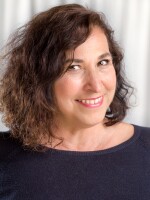The streets of Skid Row are paved with crack cocaine, heroin and just about every kind of illegal substance. For years, the area in downtown Los Angeles has been a haven for drug dealers preying on the thousands of homeless people living on the streets -- but now the LAPD is trying to crack down on specific dealers.
"You see it day in and day out," says one woman too afraid to give her name. She describes the neighborhood as an open-air market for narcotics dealers. "They do it right in front. It's not even on the sly anymore."
To demonstrate how pervasive the problem is, LAPD senior lead officer Deon Joseph took NPR to one of his favorite lookout posts: the rooftop of a homeless shelter. Within moments, a transaction occurred directly below.
"See that guy in the wheelchair right there? Looks like he may be trying to stuff a crack pipe," Joseph whispered. "Yup, he just made a drug deal."
Officer Joseph says deals like this happen so quickly and so often, it's impossible to catch every street dealer. He says Skid Row is filled with "sheep" -- the addicts who live there -- and "wolves" -- those who exploit and brutalize the homeless.
At a park on San Julian Street, dealers play cards, passing time between sales.
"The tables are where a lot of the shot callers sit," Joseph explains. "Three or four of them just passed by us just now. I'm looking at about seven ringleaders, eight midlevel enforcers and three or four lookouts."
'They Don't Run Anymore'
For years, Joseph and the other officers have arrested drug dealers, only to see them right back on the streets. With California prisons so overcrowded, many inmates serve only a fraction of their sentences.
"I remember years ago, drug dealers used to run from me," says Joseph, whose huge biceps stretch the sleeves of his LAPD uniform. "They don't run anymore, because they know. Basically it's like, 'All right, Joseph's gonna arrest me; all right, I'll do two weeks; all right, I'll get out and do it again.' "
A proposed new legal strategy is meant to lock up Skid Row drug dealers longer. The injunction targets 80 well-known dealers. They'd be arrested for so much as stepping foot in the area, and they'd face at least six months behind bars.
LAPD Capt. Todd Chamberlain says it's the first time L.A. is going after the dealers by name -- those who've been arrested multiple times.
"They're here because the people who buy their drugs are here, the people they can exploit, the people who they know are weak, and it's an easy target to sell to them," says Chamberlain. "We're not going to just throw up our hands and say, 'This is a no man's land.' That might have been done for too long, for too many years. That's why it's so important to have this other tool available, to say, 'We know you're doing it, now you just can't do it here anymore.'"
Switzerland For Drug Dealers
L.A. law enforcement has been using injunctions for years to keep gang members from congregating on their home turf. But Bruce Riordan, who heads the city attorney's gang division, says this is the first time his office is targeting gangs who prey on Skid Row.
I remember years ago, drug dealers used to run from me. They don't run anymore, because they know. Basically it's like, 'All right, Joseph's gonna arrest me; all right, I'll do two weeks; all right, I'll get out and do it again.'
"The area has been described as a sort of Switzerland for drug dealing, where the various gangs who would normally be fighting with each other could come to this area, put aside their differences, sell their drugs, and then commute back to their territories, where perhaps the next day they go back to war with each other," he says.
Back on the streets, officer Joseph says it's true the street gangs band together to control the drug trade on Skid Row.
"It's pretty much a gentlemen's agreement," he explains. "They'll put down their colors and work with the gang that's most prominent here. You have to get the blessing from them to operate. So they'll allow other gang members, it doesn't matter if you're Crip, Blood, Piru, Swan or someone else, they allow you to work for them, and sell your drugs in peace."
Keeping Predators Out
The injunction still needs to be approved by a judge, but word is already out on the streets.
Mark Barcus Butler says he posted a notice about banned dealers on the walls of the recovery shelter where he works. He says people have been checking to see whether their names are listed, and some of them have begun to lie low.

"If we can get the predators out of the area, then the people who are here have a better chance of getting, receiving the help we trying to offer," he says. "That's what we've been needing for a while."
Some recovering addicts seem relieved, too.
"Dealers are everywhere," says Murphy Holmes, who's lived on Skid Row for 30 years. "Everybody knows that downtown is a holding pod for substance abuse and debauchery."
Holmes says he supports the new crackdown on drug dealers, "because what they're doing is they're killing their own people. It's called genocide."
L.A. police say if the injunction works to keep the first 80 drug dealers out of Skid Row, they'll keep adding names to the list to try making the area drug-free.
Copyright 2022 NPR. To see more, visit https://www.npr.org. 9(MDAzMjM2NDYzMDEyMzc1Njk5NjAxNzY3OQ001))







